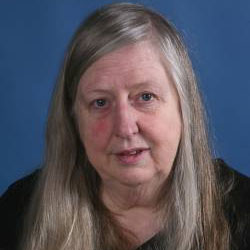When you look out across the fields
And you both see the same star
Pitching its tent on the point of the steeple –
That is the time to set out on your journey,
With half a loaf and your mother’s blessing.
Leave behind the places that you knew:
All that you leave behind you will find once more,
You will find it in the stories;
The sleeping beauty in her high tower
With her talking cat asleep
Solid beside her feet – you will see her again.
When the cat wakes up he will speak in Irish and Russian
And every night he will tell you a different tale
About the firebird that stole the golden apples,
Gone every morning out of the emperor’s garden,
And about the King of Ireland’s Son and the Enchanter’s
Daughter.
The story the cat does not know is the Book of Ruth
And I have no time to tell you how she fared
When she went out at night and was afraid,
In the beginning of the barley harvest,
Or how she trusted to strangers and stood by her word:
You will have to trust me, she lived happily ever after.
Notes on the Poem
What is poetry good for? If you need some kind of utilitarian reason for why it is created, Eiléan Ní Chuillenáin's tribute to a recently wed couple is not only a fine answer, but you'll see that it both serves and delightfully transcends being functional. Whether or not a life milestone is observed through an explicitly religious lens, most such events - births, weddings, funerals and so on - are indeed marked with some kind of ceremony, even if it's secular. Ní Chuillenáin's benediction for Niall Woods and Xenya Ostrovskaia has references for all tastes and sensibilities, from the biblical to the historical, mythical and folkloric. She's blended them all with an understated whimsy that surely struck the right notes as everyone clinked their goblets at the Dublin celebration. In addition to the words, the typography distinguishes this poem relative to the occasion for which it was produced. Why is the entire poem in an italic typeface? Often, introductory texts, epigraphs or preambles are italicized; it's as if Ní Chuillenáin's words introduce the poem that has yet to begin, the poem of Niall and Xenya starting their life together. As the 2010 Griffin Poetry Prize judges observed as they pondered The Sun-fish, the collection from which this poem is taken, "Ní Chuilleanáin poses many questions – not always directly – and often chooses to leave the questions themselves unresolved, allowing them to resonate meaningfully past the actual poem’s end." As she says here, there is no answer at the end of this yet-to-be-written story, and we'll just have to trust that it turns out well. It's a splendid way to bless a marriage.
